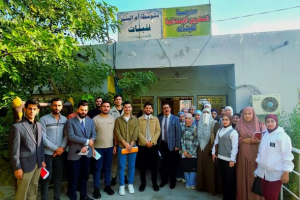
Physics leads the future
A specialised scientific symposium at Diyala University reveals the secrets of innovation and sustainable development
The Faculty of Basic Education at the University of Diyala – Science Department, in collaboration with the Media and Government Communication Division and the Continuing Education Division, organised a specialised scientific symposium entitled ‘Physics and its role in achieving sustainable development goals’, with the participation of a number of teachers and students.
The seminar, which was presented by Prof. Zuhair Hussein Jawad and Dr. Nawar Thamer Mohammed, aimed to highlight the vital role of physics in understanding natural phenomena and employing them to support scientific and technical initiatives that contribute to achieving sustainable development goals and promoting scientific research and innovation among students.
The symposium included discussions on several key topics: The first topic provided an explanation of the role of physics in the development of sustainable technology and clean energy. The second topic discussed the contribution of physics in addressing environmental challenges and achieving green growth strategies. The third topic reviewed how physical concepts can be used to promote scientific and technical education and innovation among younger generations.
The symposium featured scientific contributions from faculty members and students, which enriched the discussion and deepened the practical understanding of the topics.
In his speech, the Dean of the Faculty, Assistant Professor Dr. Ayman Abdul Aoun, highlighted the importance of integrating basic sciences in achieving sustainable development goals and supporting innovative research projects.
The symposium recommended continuing to organise such scientific symposiums, encouraging applied scientific research, and activating the role of students in sustainable initiatives that serve society and the environment.
The objectives of the symposium are in line with the Sustainable Development Goals, particularly Goal 4, ‘Quality Education,’ through the promotion of scientific research and applied learning, and Goal 9, ‘Industry, Innovation and Infrastructure,’ through the support of scientific and technical innovation to achieve sustainable development.


![]()



